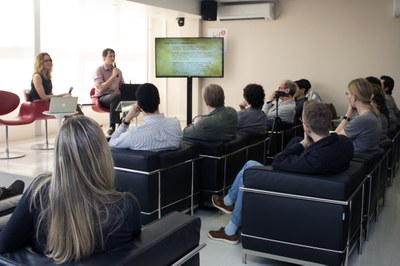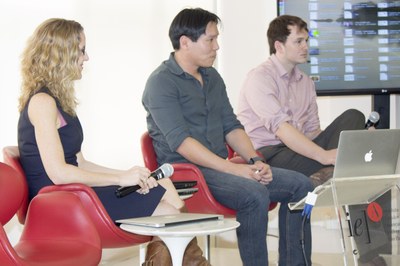Reflections on Time – 13 Young Researchers take on a multidisciplinary approach and prepare for the future
The theme at this year’s Intercontinental Academia (ICA) has centred round the issue of Time. From astrophysics to chronobiology, from philosophy to anthropology, guest speakers have expanded on this issue in their varied disciplines exploring how time plays a pivotal role in shaping the world around us, and consequently shaping our understanding of it. Cyclical or linear, measurable or incalculable, vast or microscopic, eternal or finite, relativist or absolute, time as a concept (or a reality) affects us all. Scholars from every field, be it the humanities or applied sciences, inadvertently approach the concept of time in their own research. What we witness at a multidisciplinary event such as ICA, thanks to the broadness of the chosen theme, is that every talk brought an interesting new perspective to the table, which allowed fellow academics to participate in a free and welcoming dialogue on the issue of time. Despite the increased specialisation (if not narrowing) of academia today, ICA proves that there can be events when multiple disciplines come together in a healthy and stimulating scholarly amalgam. Breaking out of each of our research moulds, tightly categorised and highly specific, ICA provides a platform of interdisciplinary study where each talk can spark new conceptualisations and even shed some light on our own approach to the issue of time.
Alongside the presentations by professors from across the globe, thirteen early career academics were invited to attend the event and during the second week of the conference reflect more carefully on the issues that had been covered. As their field of interest revolves round the issue of time, these young researchers could couple their own research with the work presented by the senior academics, thereby broadening their field of inquiry and approach to the subject. The outcome of these reflections was presented at the end of ICA in the Closing Report and will be revisited in full at the next edition of Intercontinental Academia hosted at Nagoya University (Japan) in 2016.
 In their closing report, the young scholars presented a very cohesive, informative and ambitious proposal of what we can expect to see at next year’s event in Japan. They kick off the talk with a very warm and sincere thank you to ICA’s organisers. They are grateful for the hospitality of USP’s Institute of Advanced Studies (IEA) and for the tireless efforts of the IEA team throughout the 2-week period, for the inspiring presentations from the invited guest speakers, and for the kind invitation from Nagoya University delegates to next year’s event. They also offer a special thank you to Professor Martin Grossmann and Professor Regina Markus for their time and dedication to make this event possible. Overall, the young delegates enjoyed the incredibly enriching sociable nature of the event itself. The immersive quality of this year’s edition of ICA has allowed these young researchers to bond with one another beyond any of their expectations. Placed under the same roof and exposed to such an invigorating programme has encouraged these young delegates to share their scholarly interests with one another but also develop strong friendships that will be sure to outlast this (and even next) year’s event.
In their closing report, the young scholars presented a very cohesive, informative and ambitious proposal of what we can expect to see at next year’s event in Japan. They kick off the talk with a very warm and sincere thank you to ICA’s organisers. They are grateful for the hospitality of USP’s Institute of Advanced Studies (IEA) and for the tireless efforts of the IEA team throughout the 2-week period, for the inspiring presentations from the invited guest speakers, and for the kind invitation from Nagoya University delegates to next year’s event. They also offer a special thank you to Professor Martin Grossmann and Professor Regina Markus for their time and dedication to make this event possible. Overall, the young delegates enjoyed the incredibly enriching sociable nature of the event itself. The immersive quality of this year’s edition of ICA has allowed these young researchers to bond with one another beyond any of their expectations. Placed under the same roof and exposed to such an invigorating programme has encouraged these young delegates to share their scholarly interests with one another but also develop strong friendships that will be sure to outlast this (and even next) year’s event.
The purpose of this closing report is to present an outline of what the young scholars hope to achieve for the next ICA in Japan. The main outcome of their collaborative work - that will continue over the next year until March 2016 - will be an interactive online guide for students and researchers who wish to develop or extend an interest in the concept of time. On this platform, the young researchers will present lecture-like films covering a wide variety of topics that they have carefully devised on the issue of time. However, they want this platform to be as interactive as possible, so that viewers can post their questions, their comments or feedback, upload their own research onto the site, and naturally download papers and interesting material as a way of expanding the on-going dialogue on time. Geared at a wide audience, this online portal will be very multidisciplinary and will surely have something for anyone interested in the concept of time. In order to make their video lectures more visually stimulating, the young researchers propose to use an animated video programme (such as the RSA Animate series, for instance), which will allow them to design and illustrate their ideas as they speak, thereby helping them get their message across in a clear and innovative manner to the digital viewer.
Given the enormity of the subject matter, the young researchers have envisioned 4 foundation themes that should encapsulate all the areas to be covered on this online platform. They present these themes under the headings of: What is time? How is time perceived? How is time conceptualised? and lastly How is time used? Within these broad questions, they have also developed 13 key categories that will be presented by individual members on the online platform and at next year’s event, including: how time is measured; whether or not time is relative; the traces that time leaves behind; what symbolic representations of time mean to us; whether non-humans also have a sense of individual time; how time is valued; can the future be predicted and is time ‘running out’; does time have a history and why the present is so special to us; the temporal illusions of time; the relationship between time and causality; how rhythms interact; and lastly how our conceptualisation of time may change in the future. It is clear that careful thought has been invested in developing these themes over the last few days of the event. After a week-long conference packed with enriching talks on the issue of time, the young researchers have made excellent use of their own ‘free time’ to discuss their project and bring it to life in just a few short days. Working across a variety of disciplines has its obvious challenges, where ontological standpoints, methodological approaches, technical language and even research outcomes differ immensely across scholarly fields. Overcoming these challenges is what cross-disciplinary research is all about and it is clear from this final presentation that these young researchers have made a point to cross over into one another’s field of study and expand their own understanding of the concept of time. Extending this multidisciplinary dialogue to a wider audience is the purpose of the online platform and the goal of the young researchers over the coming months.
 To conclude their presentation, the young scholars present us with a ‘wish list’ of possible professors that could be invited to speak at next year’s event. Although the young researchers thoroughly enjoyed listening to the research by the senior academics that presented at this year’s event, and appreciate the range of disciplines that together they covered, they would ideally like to hear more on the issue of time from economists, philosophers, historians, ecologists, art historians, and/or linguists so as to cover an even wider range of fields that they felt were missing at this year’s gathering. To wrap up this closing report and ICA 2015, we are presented with a warm welcome video from Professor Nori Shinohara, Director of the Institute of Advanced Research at Nagoya University, inviting the young and senior researchers to the 2016 edition of ICA.
To conclude their presentation, the young scholars present us with a ‘wish list’ of possible professors that could be invited to speak at next year’s event. Although the young researchers thoroughly enjoyed listening to the research by the senior academics that presented at this year’s event, and appreciate the range of disciplines that together they covered, they would ideally like to hear more on the issue of time from economists, philosophers, historians, ecologists, art historians, and/or linguists so as to cover an even wider range of fields that they felt were missing at this year’s gathering. To wrap up this closing report and ICA 2015, we are presented with a warm welcome video from Professor Nori Shinohara, Director of the Institute of Advanced Research at Nagoya University, inviting the young and senior researchers to the 2016 edition of ICA.
So this brings us to the end of ICA’s 2015 event hosted by the University of São Paulo’s IEA. All participants are both physically exhausted and mentally drained. However, they are in equal measure academically stimulated and driven to do more. They leave the bustling city of São Paulo motivated to expand their research into brand new territories and feel emotionally fulfilled by the success (both social and scholarly) of the event itself. This two-week gathering gave participants not merely a taste of Brazil, but more importantly a taste for better and more exciting things to come in the field of cross-disciplinary research. Presented as a platform for exploring the issue of time, participants leave ICA with much more than some interesting notes on their laptops and natty business cards in their wallets. They leave with a sense of purpose and a vision of the future. Time will tell if this cross-disciplinary enthusiasm will spread to even more fields of study and institutes of advanced research across the globe, and how these gatherings will directly affect each researcher’s own Institute of Advanced Studies back home. For now, the participants pack their bags and prepare themselves for next year’s event where young and senior researchers will share once again their thoughts on the issue of time. Japan in springtime is simply the ‘cherry on top’ that they are all looking forward to already.
